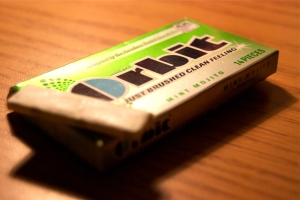Got any gum? Not on the C.W. Post campus, you don’t. You can try the Hillwood Cafe, the vending machine in Life Sciences, the Bookmark in the library, and the mini shop in Humanities, and you will not have any luck.
“I am here 30 years, and I haven’t seen one piece of gum purchased,” said Joan Lavin, the cashier in Humanities Hall. “They [students] have to purchase it on the outside. There was a store where you could buy anything: gum, candy, cards, whatever you wanted. They did have it, but then, they stopped it.”
According to NBC, a study from the Baylor College of Medicine found that chewing gum may have a positive effect on academic performance in teenagers. Other studies have suggested that chewing gum may help reduce stress, may ease anxiety and may enhance alertness.
“Its gum,” said senior Criminal Justice major Jennifer Ducles. “We are all adults here. I think they should bring it back; we could handle it. It’s a different time. They have to have gum.”
In June 2001, Aramark, a leader in providing award-winning food services, facilities management, uniform and career apparel to health care institutions, universities, school districts, stadiums, arenas, and businesses around the world, took over food service for the C.W. Post campus.
“Dining Services has not sold gum on campus for several years as a university policy,” said Shawn Carvajal, the General Manager of C.W. Post’s dining services. “I have not had any real concerns or questions regarding not selling gum on campus. In the past five years, there have been minimal questions regarding not selling gum on campus. Energy drinks are another item that we do not sell on campus.”
Lavin, who works for Aramark, explained the policy. “Students don’t know what to do with it when they are done,” said Lavin. “It goes under the desk, on the floor, under the set, and they all got tired of cleaning it up. I feel bad for the guys that have to clean it. That’s a hard job to do. That’s why it is a gum -free campus.”
However, Rev7, a new gum developed by Revolymer, is water-soluble. At the same price as Wrigley’s 5, Rev7 is “readily removed” from sidewalks, carpets and clothes. It will disintegrate to a fine powder within six months by the use of “mild agitation in water,” which would make cleaning up the gum a much simpler task.
Gum can also be dangerous. Its added ingredient, sugar, has been linked to an increased risk of cavities, and sugarless chewing gum often contains the artificial sweetener aspartame, which has been linked to headaches, insomnia and heart palpitations.
“People are still going to bring gum on campus,” said first year graduate student Chris Kwozbo, a Secondary English Education major. “Buying it on campus would be a lot easier. I don’t know what the harm is to really having it on this campus. For something like 30 years, I think it’s kind of sad. It’s a weird thing to have on the books.”




Be First to Comment